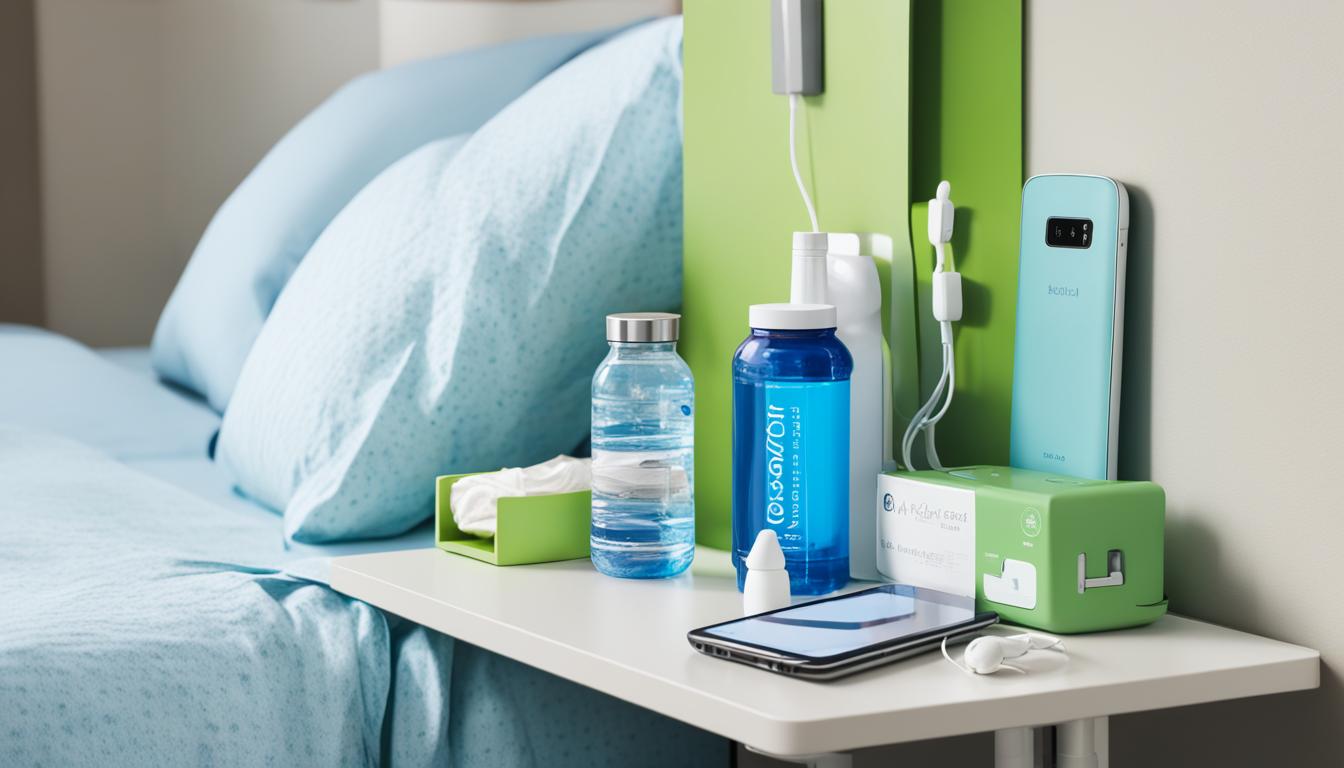Getting ready for a hospital stay can feel overwhelming. But, with the right info and planning, you can make it easier. This guide will help you with the key steps before you go to the hospital. You’ll learn about understanding your stay, arranging transport, and checking your insurance.
Key Takeaways
- Understand the purpose of your hospital stay and communicate your concerns with your healthcare team.
- Gather information about your condition or procedure and ask important questions.
- Build a support system by involving family and friends for emotional support.
- Pack essential personal belongings, medication, and medical records.
- Arrange transportation to and from the hospital.
- Verify your insurance coverage and documentation.
- Familiarize yourself with the healthcare team and your rights as a patient.
Understand the Purpose and Communicate
Before you go to the hospital, it’s important to know why you’re there. Learning about your medical condition or the procedure helps reduce worry. You can then ask smart questions to your healthcare team. It’s key to talk openly with your doctors, nurses, and others about what scares you. They want to help ease your fears and make your stay comfortable.
Gather Information About Your Condition or Procedure
Learning about your condition or procedure can make you a stronger part of your care team. Look for trustworthy sources like good health websites or materials from your hospital. This way, you can learn about:
- Your diagnosis and the reasons behind it
- The treatment choices and their good and bad sides
- What to expect during the procedure or your hospital stay
- Any changes you need to make in your life or aftercare instructions
Discuss Concerns with Your Healthcare Team
Talking to your healthcare team is key to making sure they know what you need and to make your stay comfy. Share any worries or fears you have, like:
- Concerns about the procedure or treatment
- Worries about handling pain or discomfort
- Questions about recovering or follow-up care
- Concerns about talking to the healthcare team
Your healthcare team is there to listen and help you. They will work with you to make a plan that fits your goals and likes.
| Key Statistic | Importance |
|---|---|
| Patient education is key to getting patients more involved in their care. | Knowing about your condition and treatment helps you take part in your healthcare decisions and recovery. |
| Good patient education means looking at what the patient needs, wants, and can handle. | Customizing education for each patient leads to better results and happier patients. |
| Building trust and understanding is crucial for successful patient education. | When patients feel listened to, they’re more open to learning from their healthcare team. |
“By understanding the purpose of my hospital stay and openly communicating with my healthcare team, I can take an active role in my care and feel more confident throughout the process.”
Build Your Support System
Having a strong support system during your hospital stay can greatly improve your recovery and well-being. It’s important to involve your family and close friends for emotional support. They can offer comfort and be there for you. Also, keeping them informed about your status helps them assist you better.
Involve Family and Friends for Emotional Support
Your family and friends are key to providing emotional support in the hospital. They can visit, listen, and ease your worries. These personal connections bring comfort and motivation as you recover.
Keep Loved Ones Informed About Your Status
It’s crucial to update your loved ones on your health. This helps them understand your situation and support you better. Consider choosing a family member or friend to share updates with everyone.
| Support System Benefits | Impact on Hospital Stay |
|---|---|
| Emotional comfort and care | Improved mental well-being and faster recovery |
| Practical assistance with daily tasks | Reduced stress and burden on the patient |
| Advocating for your needs with healthcare providers | Ensures your concerns are addressed promptly |
“A strong support system can be the difference between a difficult and a manageable hospital stay. Surround yourself with the people who care about you the most.”
Pack Essential Items for Your Hospital Stay
When you’re getting ready for a hospital stay, packing the right things can really help. It makes you more comfortable and keeps you calm. It’s good to organize your items before you go to make things easier for you.
Personal Belongings and Toiletries
First, collect some comfy clothes like loose pajamas and a light robe. Also, pack a pair of non-slip slippers. And remember, bring your toothbrush, toothpaste, hairbrush, and any other personal care items you’ll need.
Having these basic toiletries with you will make you feel more at ease in the hospital.
Medication List and Medical Records
Make sure you have a list of your medicines, including how much and how often you take them. This is important for your doctors and nurses to give you the right care. Also, bring any medical records you might need, like your health insurance card.
Think about making a hospital stay packing list. Include things like your phone and charger, earbuds or headphones, books or magazines, and healthy snacks. But remember, only pack the essentials because hospital storage is limited.
By packing the right items, you can focus on getting better in the hospital. Gathering your personal stuff and medical info ahead of time makes your stay more comfortable and informed.
Arrange Transportation
Having a plan for getting to and from the hospital is key when you’re preparing for a stay. It’s best to arrange rides with family, friends, or caregivers. This makes the whole process easier and less stressful.
Many hospitals suggest getting a ride home set up. This is because you’ll likely be discharged early, before 11 a.m. So, make sure you have transport ready between 8:30 a.m. and 11 a.m. on your discharge day. If you can’t drive because of your health or surgery effects, having someone to pick you up is crucial.
The hospital won’t pay for non-emergency transport. But, they can give info on local ride services. They also have a “Meds to Beds” program. This program delivers your prescriptions to your room before you leave.
Tips for Arranging Hospital Transportation
- Talk to family and friends to set up a ride to and from the hospital.
- If you need it, look into and book a non-emergency transport service. Remember, you’ll have to pay for it.
- Use the hospital’s “Meds to Beds” program to get your prescriptions delivered to your room before you go home.
- Talk about your transport needs with the hospital’s discharge planning team. They can offer advice and resources.
Planning your transport ahead can make leaving the hospital smoother. It helps reduce stress and lets you focus on getting better during this important time.
| Statistic | Data |
|---|---|
| Typical Discharge Time | Patients are usually discharged from the hospital before 11 a.m. |
| Hospital Transportation Costs | Infinity Care Hospital does not pay for patient transportation costs from the hospital to home, including Long Term Care. |
| Discharge Window | Discharge is typically before 11 a.m., meaning patients leave between 8:30 a.m. and 11 a.m. |
| Non-Emergent Transport Options | If needed, patients or their families can arrange a ride through a non-emergent transport service, with the responsibility for the costs lying with the patient or their family. |
| Hospital Prescription Delivery | The hospital provides a “Meds to Beds” program for patients to have their prescriptions filled and brought to their bedside before leaving. |
Verify Insurance Coverage and Documentation
Before you go to the hospital, make sure you check your insurance coverage. Knowing what’s covered and what costs you might face can prevent delays. It’s an important step to take.
Start by looking over your insurance policy carefully. Make sure you know about deductibles, co-payments, and any limits. This will help you understand what you might need to pay for during your stay.
Also, collect all your insurance papers like your card, pre-authorization forms, and other important documents. Having these ready will make checking in easier and help the hospital team help you better.
Some hospitals prefer cashless payments over cash. This makes patients more likely to choose them for care. Working with a Third-Party Administrator (TPA) can also help hospitals reach more people, making them more popular.
It’s a good idea to know what the hospital needs from you in terms of insurance documents. This could include things like a hospital registration certificate and other details. Getting these ready ahead of time can make things go smoother when you arrive.
Hospitals must give you a list of rates for things like room rent and nursing charges. Make sure you look at these and know about any discounts or incentives for early payment.
By checking your insurance and getting your documents in order, you can go into your hospital stay feeling secure. You won’t have to worry about the costs, so you can focus on getting better.
Familiarize Yourself with the Healthcare Team
When you’re in the hospital, you’ll meet a team of healthcare pros. This includes doctors, nurses, technicians, and support staff. Getting to know your healthcare team and their roles can make you feel more at ease and in control of your care.
Your hospital’s healthcare team might have:
- Doctors – They look after your medical care and treatment plan
- Nurses – They give you medicines, check on you, and care for you all the time
- Nursing assistants – They help nurses with tasks like daily activities and checking your vital signs
- Respiratory therapists – They help patients who have trouble breathing
- Physical and occupational therapists – They help you get stronger, move better, and be more independent
- Dietitians – They make special food plans for you to help with your recovery
- Social workers – They give emotional support and help plan your care after you leave the hospital
- Chaplains – They offer spiritual support during your stay
Knowing what each healthcare professional does can make your hospital stay easier. Don’t be shy to ask questions and talk to your team. This way, you’ll get the best care possible.
| Healthcare Team Member | Role and Responsibilities |
|---|---|
| Doctors | They manage your medical care, diagnose, and treat you |
| Nurses | They give you medicines, watch over your health, and care for you day and night |
| Nursing Assistants | They help nurses with everyday tasks and checking your vital signs |
| Respiratory Therapists | They give special care to patients who have trouble breathing |
| Physical/Occupational Therapists | They help you get stronger, move better, and be more independent |
| Dietitians | They create special food plans to help with your recovery |
| Social Workers | They offer emotional support and help plan your care after you leave the hospital |
| Chaplains | They give spiritual support during your stay |
Getting to know the hospital staff and their roles helps you understand the healthcare team’s goal. They work together to make sure you’re well taken care of during your stay.
Know Your Rights and Responsibilities
When you’re in the hospital, it’s key to know your rights and what you need to do. Learning about the hospital’s rules helps you get through your stay better. It also makes sure your needs are looked after.
Patient Rights
- Right to privacy, protection from abuse or neglect, and confidentiality of medical information
- Right to informed participation in healthcare decisions
- Right to access medical advice meeting quality standards
- Right to access clinical records and clear descriptions of medical condition and care plans
- Right to complaint procedures and cost information
Patient Responsibilities
- Provide comprehensive health information, including past medical history and medications
- Follow treatment plans and actively participate in care
- Keep scheduled appointments or notify the hospital in advance of any changes
- Respect the rights of other patients, visitors, and hospital staff
- Comply with hospital rules and safety regulations, including the no-smoking policy
- Take responsibility for the safety of personal belongings
- Provide accurate information to insurance companies for timely claim processing
Knowing your rights and doing your part helps make your hospital stay better. Remember, the hospital’s Patient Relationship Manager is ready to help at +91 8303710006 +91 8303710017 or info@infinitycarehospital.com with any questions or worries.
“Knowing your rights and responsibilities as a patient can empower you to advocate for your healthcare needs and contribute to a successful hospital stay.”
How to Prepare for a Hospital Stay: A Comprehensive Guide
This guide gives you key tips and info to prepare for a hospital stay. It’s for both planned procedures and sudden medical emergencies. By following these steps, you can lower stress, make your stay more comfortable, and focus on getting better.
Communication, preparation, and a strong support system are crucial for a smooth hospital stay. Many heart procedures are planned ahead, giving you time to prepare. Lead Cardiac Surgery Nurse Practitioner Jackie Younker says quitting smoking before surgery is vital for your heart and lung health. Lead Cardiologist Dr Abhishek Vikram Singh, Infinity Care Hospital Varanasi suggests staying active before surgery to help you recover faster.
It’s important to keep conditions like diabetes and high blood pressure under control before surgery. Pre-admission checks take about an hour and cover physical exams, infection tests, and a review of your medications. If you have carers, tell the hospital about their role and ask for help from family, friends, or social services when needed. After leaving the hospital, you can get free intermediate care for up to six weeks to help with your recovery.
FAQ
What is the purpose of understanding my medical condition or procedure before a hospital stay?
Knowing about your medical condition or procedure before going to the hospital can ease your worries. It lets you ask smart questions to your doctors. This makes you feel ready and comfortable while you’re there.
How can involving my family and friends help during a hospital stay?
Having your family and close friends by your side can offer emotional support. They can keep your loved ones updated on your health and help with any tasks needed.
What essential items should I pack for my hospital stay?
Pack your personal items like comfy clothes, slippers, a toothbrush, and anything that makes you feel at ease. Don’t forget to bring a list of your medicines and any important medical records.
Why is it important to have a plan for transportation to and from the hospital?
Having someone to drive you to and from the hospital is key, especially if you can’t drive because of your health or treatments. It ensures you get there safely.
What should I do to verify my insurance coverage and understand the costs involved?
Check your insurance policy and make sure all pre-authorizations are done before you go. Collect all insurance papers you need. This helps avoid delays and makes you aware of costs.
How can I familiarize myself with the healthcare team during my hospital stay?
Get to know your healthcare team, like doctors, nurses, and others. Knowing their roles helps you feel more in control and comfortable during your care and recovery.
What are my rights and responsibilities as a patient during my hospital stay?
Learn about the hospital’s rules, like visiting times and how to file complaints. Knowing your rights and duties helps you move through your stay smoothly and ensures your needs are met.




